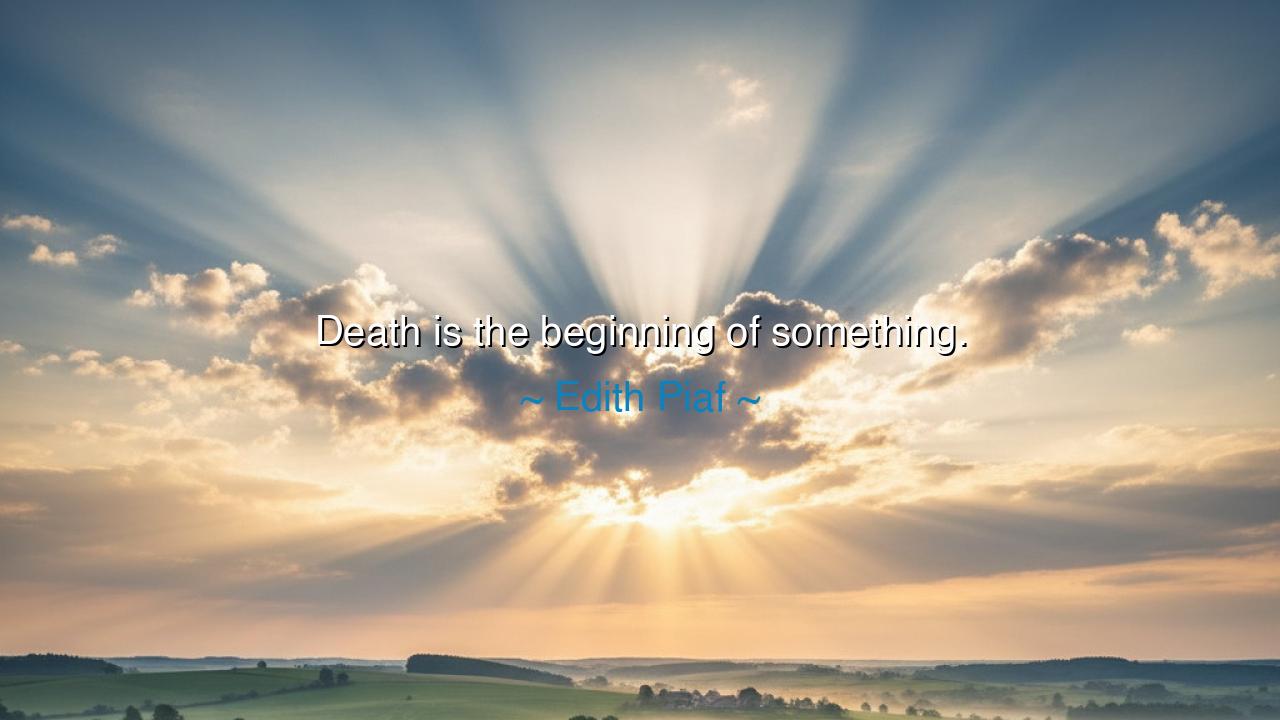
Death is the beginning of something.






h Piaf once said: “Death is the beginning of something.” These words, simple yet resounding, emerge from the depths of a soul that knew both sorrow and song. Piaf — the “Little Sparrow” of France — sang of love, loss, and redemption with a voice that trembled between despair and ecstasy. For her, death was not the extinguishing of light, but its transformation — a passage from one form of being into another. She had seen too much suffering to believe that life ends in silence; she believed, rather, that from every ending, something is born — a truth, a memory, a legacy, or perhaps, a rebirth unseen by mortal eyes.
To say that death is a beginning is to see beyond the veil of fear that shadows the human heart. Most men dread death as an abyss, a vanishing into nothingness. But the wise — the poets, the saints, the dreamers — have always known that endings are but doors. The seed must die before the flower blooms; the night must fall before the dawn returns. So too must man’s body pass away for the soul, or the meaning of his life, to awaken into something greater. Piaf’s words are not merely mystical — they are profoundly human. She invites us to see in death not destruction, but transformation.
The ancients taught this same lesson in many tongues. The Egyptians built their tombs not as monuments to decay, but as gateways to eternity. The Greeks spoke of the phoenix, that immortal bird which burns itself to ash only to rise anew in brilliance. Even the early Christians believed that death was but a sleep before resurrection — the shedding of the old self so that the divine might emerge. Across all ages and lands, mankind has whispered the same hope: that what seems an ending is in truth a beginning, that death is the turning of the page, not the closing of the book.
In Piaf’s own life, the meaning of her words shines clearly. Born in poverty, raised among chaos, and marked by tragedy, she lived a life steeped in both pain and glory. She lost her daughter, her lovers, her health — yet through every loss, she was reborn through her music. When she sang “Non, je ne regrette rien” — “No, I regret nothing” — it was not defiance, but liberation. She had died a thousand small deaths — of grief, of love, of reputation — and from each one she rose again. Thus, when she said “Death is the beginning of something,” she spoke not as a philosopher in abstraction, but as a woman who had lived resurrection in the flesh.
There is a profound truth here for all who listen. Every time we lose something — a dream, a person, a part of ourselves — we stand at the threshold of death. Yet, if we look with courage, we see that something new begins: wisdom where innocence once was, compassion where pride once dwelt, strength where sorrow had laid us low. Every loss remakes us, and every ending prepares the soil for a greater growth. The death of one chapter is the birth of the next. Life, in its secret rhythm, is always teaching us this: nothing truly ends; everything transforms.
To live wisely, then, is to live without fear of endings. Let death, in all its forms, be your teacher. When love ends, do not curse it — give thanks that it taught you tenderness. When dreams fall apart, do not despair — see in their ruin the chance to rebuild with clearer vision. When people pass from your life, honor them not with endless grief, but with the life you continue to live, enriched by their memory. For even in loss, the pulse of creation continues; something begins every time something ends.
Let this lesson be a comfort to the heart and a fire to the soul: Do not fear death, great or small. Whether it comes as the closing of a day, the fading of youth, or the stillness of the final breath, it is never the end — only the doorway. Walk through it with open eyes, for beyond it lies renewal, unseen yet certain. h Piaf’s voice — trembling, defiant, eternal — reminds us that life is not a circle broken by death, but a spiral that ascends through it. To understand this is to live fearlessly, to love completely, and to die — whenever death comes — as one who steps not into darkness, but into dawn.
Thus remember, traveler of time: death is the beginning of something. Let every ending you face be met with wonder, not dread. For even as the stars burn out, their light travels forever — and so too, the soul’s song, like Piaf’s, echoes on beyond the silence.






AAdministratorAdministrator
Welcome, honored guests. Please leave a comment, we will respond soon